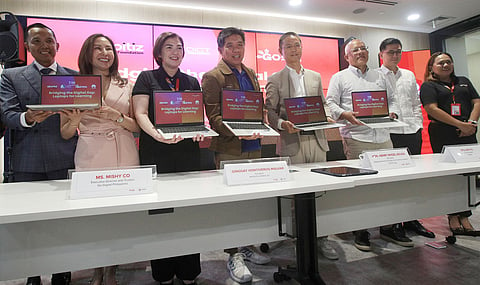
- NEWS
- the EDIT
- COMMENTARY
- BUSINESS
- LIFE
- SHOW
- ACTION
- GLOBAL GOALS
- SNAPS
- DYARYO TIRADA
- MORE

To students of last-mile schools or people from underserved communities in geographically isolated and disadvantaged areas (GIDA), a laptop presents a world of possibilities — access to knowledge, the chance to learn digital skills, and building a better future. If one GIDA student or mother would be happy to get one laptop for free, a donation of 100 such computers was a cause for celebration to advocates of digital inclusion like Aboitiz Foundation, GoDigital Philippines (GDP), the Department of Information and Communications Technology (DICT) and Huawei Philippines.
For the corporate social responsibility arm of the Philippines’ first techglomerate, Aboitiz Group, its partner organization focused on accelerating digital transformation in the country and the government agency tasked with spreading the reach of Internet to far-flung villages, receiving the so-called “Laptops for Learners” meant reducing digital inequality and advancing inclusive education in the country.
“By investing in digital access today, we are not only shaping future careers but also empowering young Filipinos to become problem-solvers, innovators and nation-builders,” said Aboitiz Foundation president Ginggay Hontiveros-Malvar during the turnover of the donation worth nearly P3 million held at the former’s office in Makati City on 9 September.
DICT Secretary Henry Rhoel Aguda, GDP executive director Mishy Co and Hontiveros-Malvar thanked the generosity and support of their partners.
Some of the laptops will go to the beneficiaries of AuroraPH, Aboitiz Foundation’s flagship program that brings renewable energy, connectivity and digital learning tools to last-mile schools across the country to help improve the quality of education in GIDA.
She recalled that a student from an AuroraPH partner school was able to continue learning even when her family could not afford books by using a borrowed tablet and an internet signal.
“She was able to access lessons, join discussions, and dream bigger for her future. Stories like hers remind us why we do what we do — because when given the right tools, our youth can thrive anywhere,” Hontiveros-Malvar said.
Launched in 2024, AuroraPH has benefitted 12 schools and more than 2,500 students and teachers to date. With support from various partners, the program is rapidly scaling toward its goal of energizing 300 schools or 20 percent of unenergized schools nationwide.
Aboitiz Foundation also acknowledged its efforts for Elevate AIDA (Artificial Intelligence Data Annotation) program, which also promotes accessible and inclusive digital learning and job opportunities for women and mothers who want to work at home.
Hontiveros-Malvar stressed that access to technology is no longer a privilege but a right and the laptops are not just devices but “stepping stones toward equal opportunity.”
Meanwhile, Aguda said that digital transformation is not just about modern tools but about giving every Filipino a fair shot at participating in the digital economy.
“Digitalization must be inclusive. Efforts like today’s turnover support not only education, but also economic resilience, communication and access to essential government services,” he said.
Aguda highlighted a critical barrier that remains: the regional pricing gap in technology. In areas outside Metro Manila, the cost of digital devices can be 20 to 30 percent higher, making them inaccessible for many. The laptops from HTP bridge this affordability gap and help ensure that no community is left behind.
The DICT secretary hailed the partnership, aptly calling this initiative a “digital bayanihan.”
As the President says, we must work with the private sector because this is a true public-private partnership. Nobody can argue about connecting people — because if you connect people, you connect them to opportunities,” Aguda said.
For her part Co said, “Moments like these remind us that there is still hope — hope in the form of opportunities for the next generation. This is about ensuring they are not just keeping up, but also finding their place in the digital world.”
Co said the common advocacy of Aboitiz Foundation and GDP is a long-term initiative.
“Our goal is simple, to make life easier and more hopeful for every Filipino,” she said. “Technology should be a great equalizer, especially in education.”
While donations are an important first step, Co added that equally essential are long-term tracking, maintenance and community engagement to ensure real and lasting benefits of the laptops.
The laptops for learning support the United Nations Sustainable Development Goals (SDG) No. 4 or quality education by providing students in marginalized areas with the tools to access digital learning. Simultaneously, they promote SDG 9 by supporting innovation and digital infrastructure, and SDG 10 by addressing the stark inequalities in access to technology and information.
In an increasingly digital world, access to technology is essential for participating in society, the economy, and civic life. The success of this initiative demonstrates the power of partnerships between government agencies, non-profits, and the private sector to bring meaningful change, according to Aboitiz Foundation.
The organization is hopeful that this partnership with DICT and GDP will spark more initiatives, more collaborations, and more opportunities for students in remote and disadvantaged areas.
“Meaningful progress is possible when we work together,” Hontiveros-Malvar said. “We’re proud to be part of a movement that believes in a future where every learner, no matter where they are, has a chance to succeed.”
As the Philippines continues to navigate its digital journey, programs like “Laptops for Learning” offer a clear blueprint for how we can achieve the Global Goals: one community, one student, and one laptop at a time, she added.
